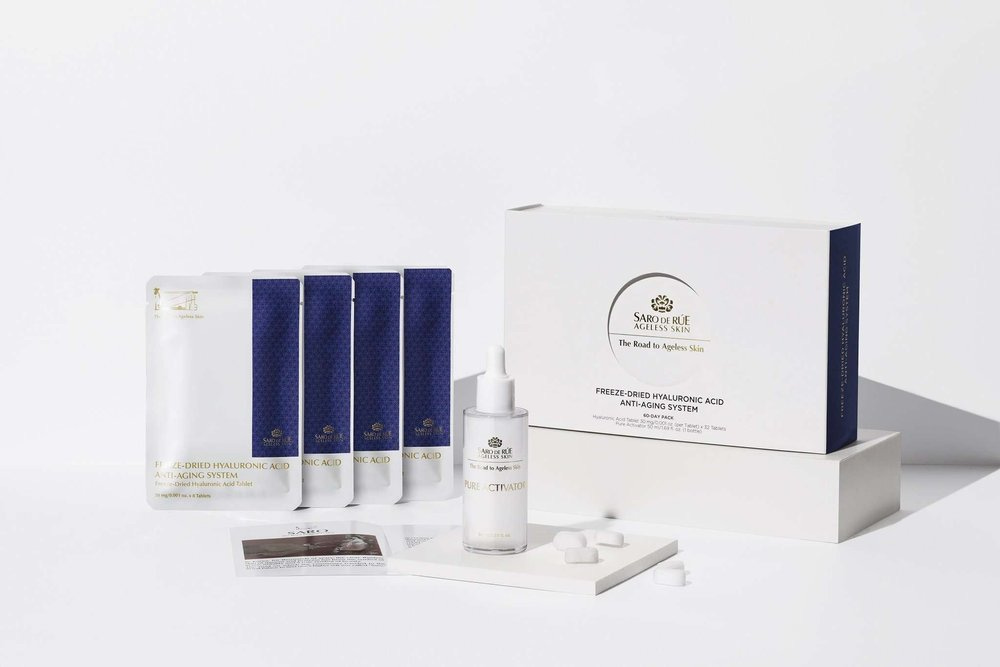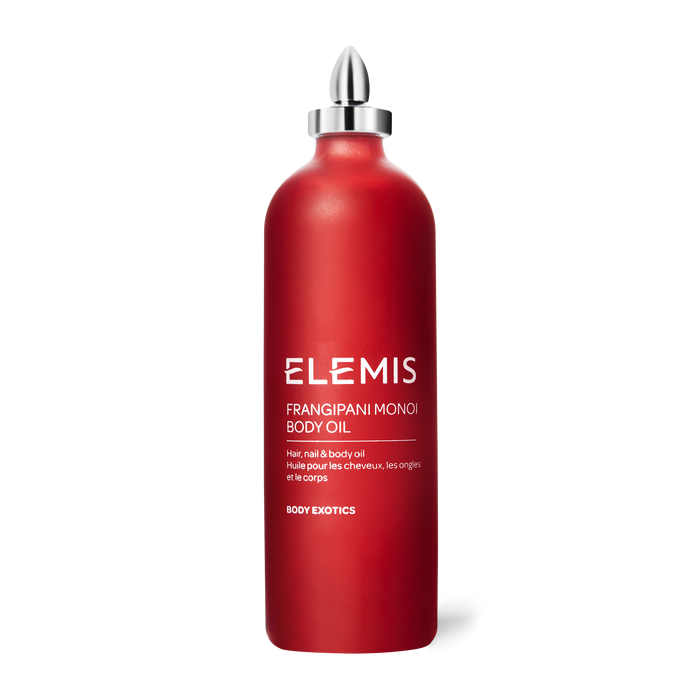
October 29, 2021
A one-of-a-kind hyaluronic acid serum, an otherworldly body oil and everything you need to know about breast cancer screening guidelines.
You've never seen an HA serum like this
In the skincare world, hyaluronic acid is friends with everyone. It’s an ideal hydrating ingredient for all skin types (including those with oily or acne-prone skin because it won’t clog pores), and it plays nicely with any other actives you may apply before or after it. It poses little to no risk of irritation to sensitive skin—and it hydrates to smooth and plump the skin on contact.
Because of its universal appeal, there are too many hyaluronic acid-based products to count. So when I come across a totally new kind of formulation it catches my attention. Meet Saro de Rue’s Freeze-Dried Hyaluronic Acid Anti-Aging System, and be warned, you’re probably going to want it.
When you get a traditional HA serum, it’s hard to know exactly how much of this moisture-attracting ingredient you’re getting since it’s suspended in a carrier (usually water). But with Saro du Rue’s approach, you get single-use tablets that are comprised of 98.5% HA (along with a bit of squalane and vitamin E). And this isn’t just any regular HA, it has a precisely formulated molecular weight that’s small enough to get into the skin but large enough to deliver a good amount of water to quench your skin’s thirst for up to 72 hours.
Now for the fun part… You add eight to 10 drops of Pure Activator to transform the tablet into a silky serum, and this carrier emulsion has several key skin benefits of its own. From antioxidant-rich pomegranate and white mulberry extracts to niacinamide and wrinkle-smoothing adenosine, the end result is a plumping, firming, brightening and, of course, ultra-hydrating treatment.
Each set comes with a 60-day supply—but keep in mind that the instructions only recommend using it every other evening. Further proof that this hyaluronic acid is so potent it keeps your skin moisturized for a whole two days!
Vacation in a bottle
I don’t know about you, but the past month has been unbelievably insane. Between my son turning 13 (and all the hoopla surrounding it), sending him to New York semi-solo for a bar mitzvah and the kitchen renovation chaos starting—I’m pooped. And I can’t remember my last real vacation. (Nashville over the summer doesn’t count because it was far from a relaxing trip and I was pretty much bugging out about my second reconstruction surgery the whole time.)
I have no choice other than to fake it ‘til I make it (the reservation for a tropical getaway, that is), and Elemis Frangipani Monoi Hair, Nail & Body Oil is my daily way to do it. Although I haven’t made my way to Tahiti or Bora Bora (yet), I imagine this is what they would smell like. Yes, the scent is the real selling point for me, tbut he oil itself is pretty amazing as well. It leaves my skin super-smooth and soft but absorbs quickly enough that my arms don’t make my desk greasy.
And it’s a good thing that a little goes a long way because I can’t see the light at the end of the stress tunnel. I have to clear out my entire kitchen by Monday (and I’ll have no access to it next week), then I have to put everything back, I’m dreading Halloween (as always), and the end of the year is usually my busiest time work-wise—with no vacation planned for the holidays since we love being here for the influx of friends visiting from up north. Elemis, take me away…
Everything you need to know about breast cancer screening guidelines
No one can ever accuse me of “pink-washing.” (As in only caring about breast cancer awareness during October—and hoping to snag a few more followers in the process.) I’ve always made a big deal about BCA because this disease has literally been part of my life since I was in my mother’s uterus, but this is my first October as a breast cancer survivor (and I’m pretty thrilled about that).
You’ve heard it before and I’ll tell you again, early detection is key not only for surviving breast cancer, but for optimal quality of life after cancer as well. I am continually shocked by questions I get from smart, savvy, highly educated women—so I thought I’d bring in one of the country’s leading breast cancer and breast surgery experts, Dr. Heather Richardson of the Bedford Breast Center in Los Angeles. If you won’t listen to me, hopefully you’ll listen to her!
InsiderBeautyBuzz: Let’s set the record straight… If you’re over the age of 40, you should be getting a mammogram every year, right?
Dr. Heather Richardson: Yes, and this is agreed upon by all of the governing bodies, including the American College of Radiology, American Society of Breast Surgery and American College of Obstetricians and Gynecologists. We all believe that it’s best to detect breast cancer as early as possible. If you have very dense breasts, your doctor may order an ultrasound as well. This is NOT a cause for alarm, even if it’s ordered after your mammogram. The point of annual screenings is to visualize and follow subtle changes within the breasts, and make sure that they are not part of an unhealthy pattern.
IBB: What about women who have a family history?
Dr. Richardson: As a general rule of thumb, if your mother, sister or aunt had breast cancer, you should begin screening 10 years before they were diagnosed, or at the age of 40 (whichever comes first). However, it’s important to keep your paternal side of the family in mind as well. For example, if your father’s sister had breast cancer in their 30s or 40s, this can carry the same weight of risk. (Your dad’s aunt in their 70s, not so much.) This is why doctors approach risk analysis on a case by case basis and try to identify a pattern.
IBB: What would indicate a need for more frequent or additional screenings such as gene testing or MRIs?
Dr. Richardson: Ideally, someone with a personal history of cancer should be tested for genetic mutations, but there are many more than just the BRCA gene (which only accounts for 5-10% of breast cancers). If someone is found to have a broken or mutated gene, then the people related to them should be tested to see if they share it. Other important markers are early and/or aggressive breast cancer diagnoses on either side of the family, even if you’re BRCA negative.
IBB: For those who send their annual mammogram results to your primary care physician or OB/GYN… When is it time to step up to a breast specialist?
Dr. Richardson: If you don’t have a family history and you don’t have “complicated” (i.e. very dense) breasts, you can stay with your PCP or OB/GYN. Odds are these doctors will refer you to a surgeon or specialist if your breasts are deemed complicated. However, if your doctor feels something and follow-up imaging is inconclusive, it may be best to see a specialist for a second opinion. And if your PCP or OB/GYN recommends any sort of urgent or aggressive treatment from the get-go, definitely schedule an appointment with a breast specialist before you make any decisions.










